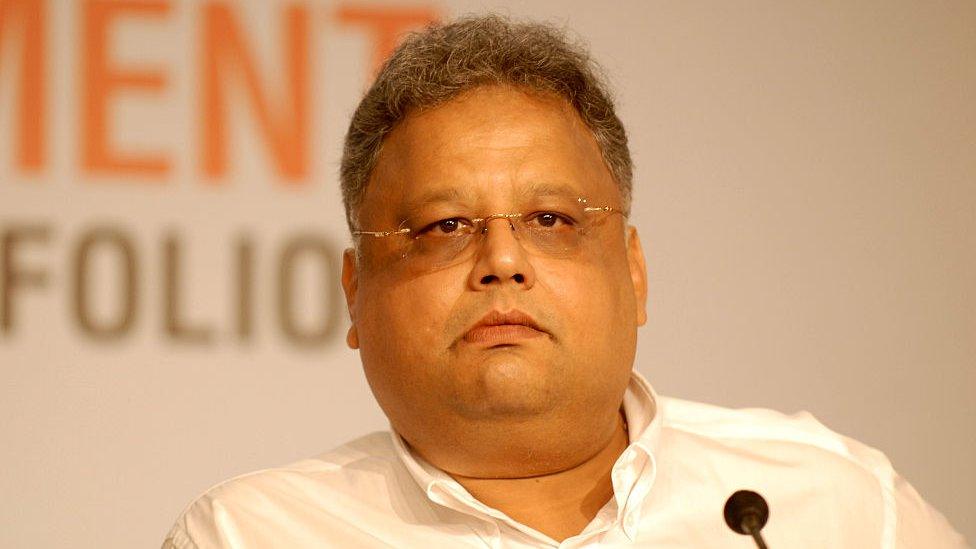Rakesh Jhunjhunwala: Tributes for India's 'stock market king' who died at 62
- Published

Rakesh Jhunjhunwala was called India's Warren Buffett
Tributes have poured in for Indian billionaire Rakesh Jhunjhunwala, who has died at the age of 62.
Jhunjhunwala, who made a fortune from the stock market, died on Sunday at a hospital in Mumbai city.
The hospital said that the cause of death was a "sudden cardiac arrest".
Often called India's Warren Buffett, Jhunjhunwala had an estimated net worth of around $5.8bn, according to Forbes magazine.
He was part of a generation of investors who benefitted from the historic 1991 reforms, which opened up India's economy.
Prime Minister Narendra Modi led the tributes to Jhunjhunwala, who was steadfastly bullish on Indian stock markets.
Allow X content?
This article contains content provided by X. We ask for your permission before anything is loaded, as they may be using cookies and other technologies. You may want to read X’s cookie policy, external and privacy policy, external before accepting. To view this content choose ‘accept and continue’.

"He was very good at reading businesses and had conviction, passion and very blunt opinions about things," said businessman Motilal Oswal, who set up one of India's leading brokerages.
Jhunjhunwala had recently backed Akasa Air, India's newest budget airline, which began operations earlier in August. While the Covid pandemic had ravaged domestic air travel for the past two years, passenger traffic has risen sharply this year.
How Jhunjhunwala made money
The son of an income tax officer, Jhunjhunwala has said that he became fascinated with stocks as a child after watching his father balance his market investments.
Jhunjhunwala began investing in the stock market in 1985, when he was 25 years old - he started off with $100 that he had borrowed from a relative, reports say.
He later set up Rare Enterprises - the name was coined from the first two letters of his name and that of his wife Rekha.
He had the reputation of being a risk-taker in his investments, many of which paid off spectacularly.
In a 2021 profile, Forbes wrote that while Jhunjhunwala "acquired his legendary Midas touch by picking winning stocks", he has also recently started seeing his private equity investments pay off.
A decade ago, he told Reuters in an interview that he didn't like being called "India's Warren Buffett", adding that the Berkshire Hathaway CEO was "far, far ahead" of him.
"I'm not a clone of anybody. I'm Rakesh Jhunjhunwala," he had said.
Bullish on India
Market veteran Ajay Bagga told the BBC that Jhunjhunwala "personified the India story".
"[He was] a young middle-class boy rising up the ranks to build such a vast fortune, and setting the stage for the growth momentum in the Indian financial markets," he said.
Mr Bagga added that Jhunjhunwala had an infectious "optimism for India". That optimism was reflected in Jhunjhunwala's other famous nickname - the Big Bull of Dalal Street, a reference to the address of the Bombay Stock Exchange.
Jhunjhunwala remained optimistic till the end - a week before his death, he told news channel CNBC-TV18, external that regardless of global economic conditions, he believed that Indian markets would grow, "but at a slower pace".
He was also a strong advocate for Indian businesses doing philanthropy.
"Rakesh was keen to make a positive social difference to India - and willing to invest significantly in India's social and educational development. He once told me that the reason for his success was that his father had encouraged him to be curious as a child." Ramji Raghavan, founder of the Agastya International Foundation, told the BBC.
Jhunjhunwala was an early investor in Agastya, donating 500 million rupees ($6.3m; £5.1m) to the foundation's mission to inculcate scientific thought and curiosity in children.
With inputs from Nikhil Inamdar, Business Correspondent, BBC News